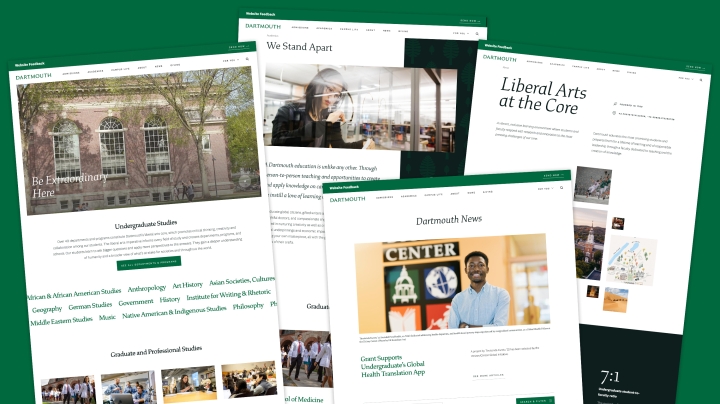Dartmouth’s website redesign process, which has been underway for 18 months, hit a milestone this week: A beta version of the site is now available online. Members of the community are invited to comment on the beta site using a short online survey. The new website will be launched later this summer.
The redesign is focused on the Dartmouth home site and Dartmouth News, a separate website that will be integrated into the new home page.
“The home page is how Dartmouth introduces itself to the world,“ says Justin Anderson, vice president for communications. ”It’s often the first stop for prospective students, faculty, and staff interested in learning more about Dartmouth. We want the structure and content of the home page to provide the information they need, based on what we know from user data.“
From the beginning, the redesign process has been guided by that user data and consultation with students, faculty, staff, and alumni who shared their suggestions and feedback as the work progressed, says Anderson, one of the project’s executive sponsors. The consultations continue this week as Office of Communications staff conduct usability testing with students on campus in person as well as with students studying remotely.
Anderson congratulated the redesign working group for bringing that shared vision to life.
”After so much hard work, we are poised to launch a redesigned site that is easier to navigate and showcases Dartmouth’s strengths as a renowned liberal arts college and robust research university in a beautiful setting ideal for learning, research, and the formation of lifelong bonds,” he says.
The redesign involves areas of the website visitors often look for when they want to learn about Dartmouth. However, the changes are designed to benefit all of the site’s users.
The most popular sites are admissions, Dartmouth’s schools, degrees offered, and departments and programs in the arts and sciences. Together, these areas received more than 3.7 million views in 2019, more than 70% of which were from external visitors such as prospective students and their families, prospective employees, the general public, and the news media.
Use of the website is increasing, making it one of Dartmouth’s most important tools for telling the institution’s story to those new to Dartmouth, says Anderson. In 2020, due in part to the pandemic, traffic to the home site increased by 33% over 2019 visits.
The new website will feature seven landing pages curated for specific audiences—students, faculty, staff, alumni, news media, families, and friends and neighbors, which users can access from the homepage. Each one contains the most useful resources for each group, the selections of which were informed by interviews with stakeholders. The new site has been designed for flexibility to ensure that it can be updated easily in the future.
Search results in the beta version will point to the current site until the new website is launched. As with the current website, the new site will adhere to accessibility standards to support people who use assistive technology to navigate the internet.
While the redesign involves almost 8,400 web pages, many elements of Dartmouth’s online presence will remain unchanged, including the graduate and professional schools’ websites, the admissions website, and the athletics website, among others.
Dartmouth is working with the web design firm Third and Grove on the project, which was approved in 2019 as part of Dartmouth’s capital expense budget.
Along with Anderson, the project’s executive sponsors are Lee Coffin, vice provost for enrollment and dean of admissions and financial aid; Mitch Davis, vice president and chief information officer; Joseph Helble, provost; Laura Hercod, chief of staff in the Office of the President; Bob Lasher ’88, senior vice president for advancement; Kathryn Lively, dean of the College; Matthew Slaughter, dean of the Tuck School of Business; and Elizabeth Smith, dean of the Faculty of Arts and Sciences.
The working group includes Anne Adams, news director and managing editor; Susan Boutwell, senior director for content; Amy Bucci, director of digital resources and strategy; Jon Chiappa, senior director of Web Services; Richard Clark, senior graphic designer for communications; E.J. Kiefer, executive director of Conferences and Events; Diana Lawrence, associate vice president for communications; Ben Morgan, associate director of Web Services; San’Quan Prioleau, UX (user experience) and visual designer for Web Services; and Erin Supinka, associate director for digital engagement.

